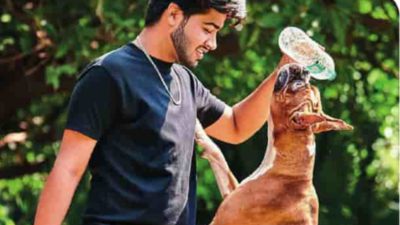Hyderabad’s pet parents are finding out the hard way that raising exotic breeds isn’t all cuddles and Instagram posts. With meltdowns on the rise, it’s the humans who are now heading to obedience school, finds Amisha Rajani.With rising incomes and aspirational lifestyles, urban pet parents in Hyderabad are increasingly bringing home exotic dogs, from Kangals and Rottweilers to Great Danes, Huskies, Saint Bernards and Mastiffs.But as these high-energy, protective working-line dogs settle into small apartments, a mismatch is brewing between instinct and environment. The result? A spike in behavioural issues with pets, and a new urban trend where it’s not just the dogs being trained, but their parents too.Dog trainers and behaviourists across the city say they’ve seen a marked shift in recent years. “Owners themselves are signing up for sessions to understand how to raise their exotic dogs responsibly. Many pet parents are reaching out even before buying a pup,” says Anand Janampally, trainer at Happy Dogs Boarding and Training School.Decoding owners’ mindset“They are willing to learn, so we customise sessions based on the breed. We also ask about the owner’s nature—are they short-tempered or overly sensitive? Do they live in an apartment? Are there kids? What’s their daily schedule? How are the neighbours? Based on this, we suggest the kind of boundaries, routines, exercises, diets that need to be put in place,” he adds.“Training exotic breeds isn’t just about obedience, it’s about decoding their psychology, understanding their original purpose, and preparing owners for the reality of parenting a demanding breed, which is not used to a 2BHK or 3BHK of an upscale gated community,” he says.A survey by Humane World for Animals India found that popular breeds in Hyderabad include Labrador Retrievers, Pomeranians, Golden Retrievers, and Shih Tzus.“These are popular for their adaptability,” says Piyush Patel, director of companion animals and engagement at the organisation.“But we recorded many owners choosing larger, high-maintenance breeds like Rottweilers, Dogo Argentinos, Great Danes, and Saint Bernards. We found that these breeds, often considered “exotic” in the Indian context, are owned by individuals who may not be prepared for the care requirements these breeds demand,” he adds.That’s where things start to unravel, especially for first-time dog owners. “If they are adopting a dog, that too an exotic breed, we simply discourage them from going ahead,” says Panneeru Teja, a dog behaviourist.“For instance, Saint Bernards and Huskies aren’t built for India’s hot and humid climate. Similarly, each breed has different needs. When those needs aren’t met, dogs develop behavioural issues. That’s why we’re increasingly seeing cases of abandonment, when owners simply can’t cope,” Teja explains.Seeing a spurt in cases of parents being unable to care for these breeds, behaviourists have started designing training plans for parents based on each breed’s purpose. “We teach parents various impulse control techniques, structured games, and socialisation techniques that introduce them to different types of people, situations, and reactions. These things must be done before they bring the dog home. Most dog owners come after their dog develops issues, and it becomes tough to train them,” says Vinod Poyilath, behaviour consultant at Woof Buddies.
Who Let The Dogs In (to Tiny Flats)?
“Breeds like Kangals which are Turkish livestock guardians or Alabais from Central Asia, were bred to protect property. If you treat them like an indie dog, you’re setting them and yourself up for frustration and failure,” he adds.“Such breeds need large spaces to roam. They may also start becoming fiercely protective of humans and spaces that don’t need to be protected, becoming a danger to the public,” Poyilath explains.He says they teach parents how to channelise their energies by letting them play in open spaces, socialise with other dogs, along with customised games to help them control their emotions.Many pet parents are learning this the hard way. “I brought home a pitbull last year. I thought it would be a good companion,” says an HR professional from Gowlidoddy.“But it turned out to be a bundle of energy, always howling, chewing, barking and being over-protective. Things changed only after consulting a behaviourist,” she said.“Most people buy dogs as a status symbol,” says Aulapuram Goutham, an animal activist. “They don’t ask: How big will this dog get? What was it bred for? Can it live in a 2BHK in Hyderabad? Will it survive 45°C summers? No breed is bad, but unprepared parenting can make even friendly dogs a danger, which is why training of parents is important,” he adds.








